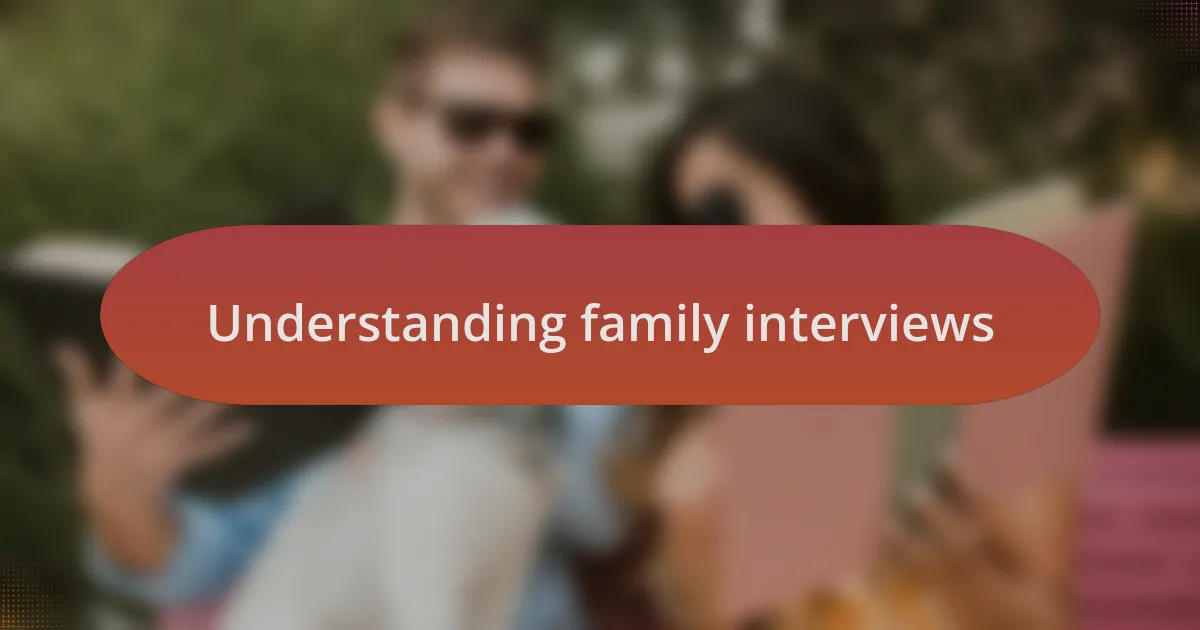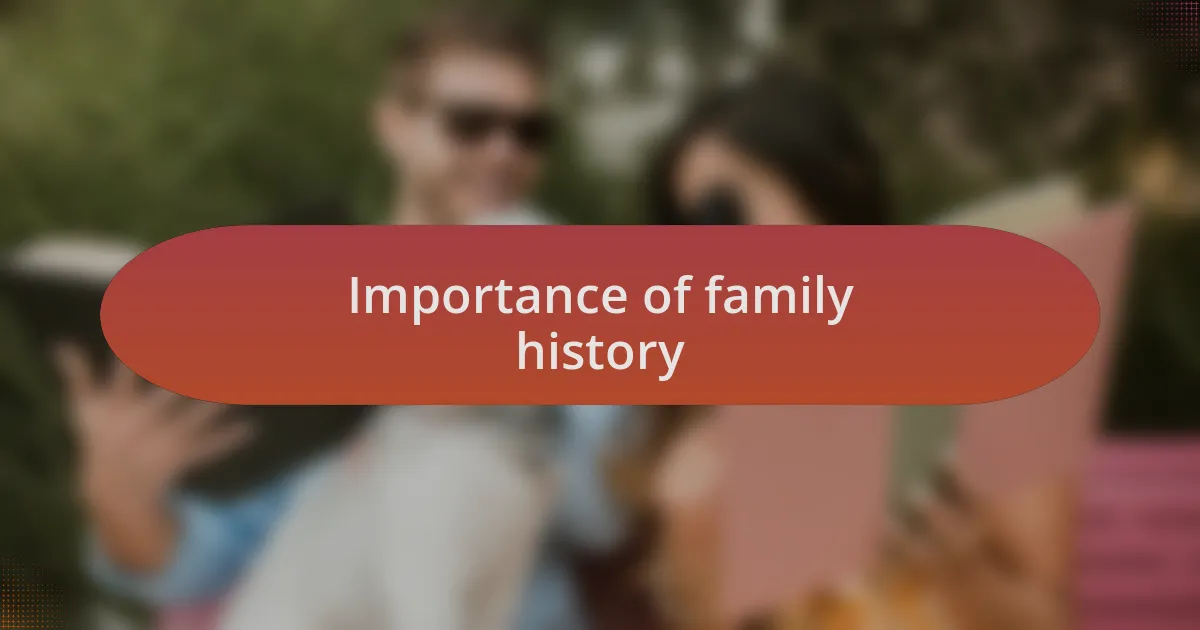Key takeaways:
- Family interviews provide deep emotional insights and connections to our ancestry, helping to uncover shared experiences and values across generations.
- Active listening and asking open-ended questions are crucial in eliciting meaningful stories that enrich our understanding of family history.
- Sharing the findings of family interviews fosters empathy and inspiration among family members, creating stronger bonds and a shared legacy.
- Insights from family stories serve as a foundation for genealogy research, bridging personal experiences with broader historical contexts.

Understanding family interviews
Family interviews are a powerful tool in understanding our roots. I remember my first interview with my grandmother; her stories unfolded like a tapestry, revealing not just facts but emotions and experiences that shaped our family. Have you ever sat down with a relative and felt the weight of their past stories? It’s an eye-opening, often emotional experience that gives depth to our lineage.
Conducting family interviews isn’t just about gathering names and dates; it’s about capturing the essence of who we are. During one session with my uncle, he shared a tale of resilience during tough times that made me reflect on my own challenges. Isn’t it fascinating how these narratives can resonate across generations, connecting our lives with those of our ancestors?
Listening actively during interviews is crucial. I learned to ask open-ended questions like, “What was your happiest memory as a child?” This not only encourages more detailed responses but also opens the door to unexpected revelations. How often do we realize that a simple question can lead to profound insights about our family history? Embracing these moments enriches our understanding of our heritage.

Importance of family history
Family history serves as a bridge connecting us to our past, and I can’t emphasize enough how transformative this connection can be. One afternoon spent listening to my mother’s youthful tales made me realize the struggles she faced were not unlike my own. Have you ever discovered that your grandparents once endured similar challenges to those you currently face? It enriches our perspective on personal hardships, giving us a sense of solidarity across generations.
Understanding our family history not only roots us in our identity but also fosters a sense of belonging. I recall a conversation with my father where he shared stories of family gatherings and traditions that infused our lives with meaning. How can we appreciate our present without recognizing the rituals and values that were passed down to us? These narratives create a continuum of love and support that strengthens familial bonds.
Moreover, delving into family history can spark a keen interest in our heritage and cultural background. When I first researched my family tree, I stumbled upon a letter my great-grandfather had written, expressing his dreams for the future. It struck me how his aspirations mirrored my own. Isn’t it amazing to find that our desires may still resonate through time? This exploration not only honors those who came before us but also inspires us to shape our own legacy.

Preparing for family interviews
Preparing for family interviews can be both exciting and a bit daunting. I remember sitting down with my grandmother, nervous yet eager, and realizing that a little preparation can go a long way. Have you ever thought about the kinds of questions that might unlock a treasure trove of stories? Crafting a list of specific topics or questions beforehand can guide the conversation and help you capture the most meaningful details.
Setting the right environment is crucial for these interviews. During one of my sessions, I chose to meet my uncle at a family park where he used to take his children. The familiarity of the surroundings brought a relaxed atmosphere, and suddenly, he was reminiscing about his own childhood adventures. How often do we overlook the significance of a location in sparking memories? It truly made a difference in the richness of his stories.
Lastly, consider the tools you’ll need for the interview. I typically bring a notebook and a voice recorder, ensuring that I don’t miss any precious words. Have you ever found yourself lost in the moment, forgetting to jot down important details? Trust me, having those tools at hand lets you focus on the conversation while knowing that you can revisit every gem later on.

Key questions to ask
When preparing for family interviews, consider asking open-ended questions like, “What was your childhood like?” or “What traditions did our family have?” One time, I posed this question to my aunt, and the stories she shared about family gatherings filled with laughter and food were beyond what I expected. It reminded me how these seemingly simple inquiries can evoke a tapestry of cherished memories.
Another important area to explore is personal experiences related to pivotal historical events. I once asked a family member how they navigated the challenges during the Great Depression. Their heartfelt recount of resilience and ingenuity not only painted a vivid picture of that era but also deepened my appreciation for their struggles. Isn’t it fascinating how our family’s past intersects with larger historical narratives?
Finally, don’t shy away from sensitive topics. Posing questions like, “How did you handle loss in our family?” can lead to profound discussions. I remember asking this of my grandfather, and his insights into coping with grief were surprisingly uplifting. It made me realize that addressing these subjects not only honors their experiences but also strengthens our family bonds.

Analyzing the collected information
Analyzing the information collected during family interviews can be a rewarding yet challenging process. After speaking with my uncle about his military service, I was struck by the layers of emotion behind his stories. Sorting through those recollections, I found myself reflecting on how his experiences shaped our family’s values, which led me to ponder: how often do we acknowledge the personal sacrifices made by our ancestors?
As I sifted through the anecdotes shared by my relatives, I noticed recurring themes that connected generations. For instance, my grandmother’s tale of perseverance during her immigrant journey resonated deeply. I realized that these narratives are not just individual stories; they are threads woven into the larger fabric of our family identity. In what ways do these shared experiences influence our own lives today?
It’s critical to look at the nuances in the details. While transcribing my father’s memories of his childhood escapades, I found minor details that unexpectedly revealed his personality. Did he mention the way his face lit up when recalling his favorite fishing spot? Those small pieces of information enriched the narrative and made me question how much we truly know about our family members beneath the surface.

Sharing findings with family
Sharing the findings of family interviews can be both fulfilling and emotional. After compiling my grandmother’s stories about her upbringing, I felt an overwhelming urge to gather my siblings and share these insights with them. How often do we overlook the rich history that resides within our own family? I watched my siblings’ faces light up as they discovered connections to their lives—realizing that our family traits, both good and challenging, stem from those not-so-distant stories.
When I shared my discoveries about my great-aunt’s bravery during tough times, it sparked a deep conversation about resilience and strength in our lives today. I remember my cousin remarking how that story inspired her when facing her own challenges. This connection between past and present made me think: isn’t it powerful how our relatives’ experiences can influence our personal journeys in unexpected ways?
I’ve also found that sharing stories can create a rich tapestry of understanding and empathy within our family. During a casual dinner, I recounted my uncle’s tale about his love for woodworking, and suddenly, my younger cousin was inspired to try his hand at crafting. It was a simple yet profound moment that reinforced the idea that these stories do more than entertain; they have the potential to inspire action and foster deeper connections among us. How often do we tap into our family’s legacy to ignite our own passions?

Using insights for genealogy research
When diving into genealogy research, the insights gathered from family interviews can serve as crucial stepping stones. I vividly recall a family gathering where my aunt spoke candidly about her parents’ immigration story. It dawned on me then how transformative this singular narrative was, not just for tracing ancestry but for understanding the challenges and triumphs that shaped our family today. Isn’t it fascinating to consider how a single story can illuminate entire branches of our family tree?
I also learned that these insights can be a foundation for deeper research. After hearing about my grandfather’s struggles during the Depression, I was motivated to explore historical records and data related to that period. This intersection of personal stories and historical context enriched my understanding of the era, helping me appreciate the resilience that runs through my lineage. How often do we underestimate the importance of connecting personal narratives to broader historical themes in our genealogy work?
Furthermore, I found that capturing the emotions behind these stories creates a richer research framework. As I collected my father’s accounts of family gatherings, I noticed how certain places became infused with memories and feelings. I remember him telling me about a cherished picnic spot where our family celebrated milestones. This helped me not only map out our family history but also create a narrative that resonates on a deeper emotional level. Does it not make our genealogy research infinitely more meaningful when it’s filled with personal significance?